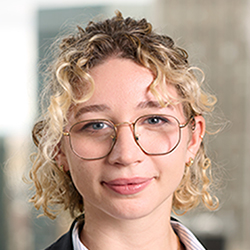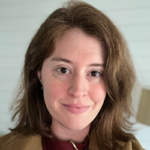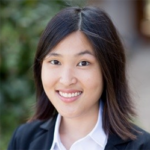

The Accelerator Initiative offers a unique mentorship and career development opportunity to a small cohort of early-career women and those who identify as nonbinary working in nuclear, international security, or technology policy.
At the Stanley Center for Peace and Security, we believe that diverse perspectives are necessary to develop effective policy solutions. This belief, along with our organization’s participation in Gender Champions in Nuclear Policy, led to the creation of the Accelerator Initiative in 2019. The initiative offers a career development opportunity for early-career women or those who identify as nonbinary working in nuclear weapons policy.
Participants chosen to be part of the Accelerator Initiative have the opportunity to participate in events organized by the Stanley Center as part of our nuclear policy work for two calendar years. (Travel and accommodations are provided.)
The 2024-25 Accelerator Initiative focuses on nuclear risk reduction. By participating in our policy dialogues, accelerators hone and demonstrate their expertise, expand their networks, elevate their profiles, and deepen their interest in nuclear risk reduction issues.
 Elin Bergner is an open source research assistant with Vienna-based One Earth Future’s Open Nuclear Network, working on nuclear risk reduction in the Indo-Pacific and Trans-Atlantic. Her research focuses primarily on nontraditional security: nuclear risk nexus, Korean peninsula security, and disinformation analysis. She is also a non-resident Fellow with the European Center for North Korean Studies at University of Vienna, and a BASIC EVN consultant for the De-siloing Existential Risk policy cycle. Bergner holds a BSc in social anthropology from Lund University in Sweden which included studies at the University of Sussex in the UK, the University of Linnaeus in Spain, the University of Hawaii in the United States, and Kyung Hee University in South Korea. She is finalizing a MSc in international political science with a specialization in global Asian studies at Stockholm University.
Elin Bergner is an open source research assistant with Vienna-based One Earth Future’s Open Nuclear Network, working on nuclear risk reduction in the Indo-Pacific and Trans-Atlantic. Her research focuses primarily on nontraditional security: nuclear risk nexus, Korean peninsula security, and disinformation analysis. She is also a non-resident Fellow with the European Center for North Korean Studies at University of Vienna, and a BASIC EVN consultant for the De-siloing Existential Risk policy cycle. Bergner holds a BSc in social anthropology from Lund University in Sweden which included studies at the University of Sussex in the UK, the University of Linnaeus in Spain, the University of Hawaii in the United States, and Kyung Hee University in South Korea. She is finalizing a MSc in international political science with a specialization in global Asian studies at Stockholm University.
 Samara Shaz is a program assistant for the International Peace and Security program at the Carnegie Corporation of New York, working specifically on the nuclear security portfolio. Previously, she was a research coordinator at MIT’s security studies program, investigating the salience of nuclear weapons in US politics. As an undergraduate, Shaz conducted research at the Union of Concerned Scientists on the marginal effects of different demographics on the nuclear taboo in the United States. Her senior honors thesis examined nuclear normative contestation as represented by emergence of the Treaty on the Prohibition of Nuclear Weapons in contrast to the Treaty on the Non-Proliferation of Nuclear Weapons. Shaz graduate cum laude from Wellesley College, earning a BA in political science with a minor in chemistry.
Samara Shaz is a program assistant for the International Peace and Security program at the Carnegie Corporation of New York, working specifically on the nuclear security portfolio. Previously, she was a research coordinator at MIT’s security studies program, investigating the salience of nuclear weapons in US politics. As an undergraduate, Shaz conducted research at the Union of Concerned Scientists on the marginal effects of different demographics on the nuclear taboo in the United States. Her senior honors thesis examined nuclear normative contestation as represented by emergence of the Treaty on the Prohibition of Nuclear Weapons in contrast to the Treaty on the Non-Proliferation of Nuclear Weapons. Shaz graduate cum laude from Wellesley College, earning a BA in political science with a minor in chemistry.
![]() Raven Witherspoon is a pre-doctoral fellow at Princeton University’s Program on Science and Global Security. She received her master’s degree in global affairs from Tsinghua University, Beijing, where her thesis explored US-China nuclear risk reduction. She continued her language studies in China as a Blakemore-Freeman language fellow, and became a Young Ambassador for the Carnegie Endowment for International Peace and an African-American China Leadership Fellow at the American Mandarin Society. Witherspoon is a former nonproliferation and national security intern at Brookhaven National Laboratory and health physics intern at Surry Nuclear Power Station. She has served as a legislative aide for a Delegate in Virginia’s General Assembly, and as a student organizing fellow of the Poor People’s Campaign. Witherspoon holds an undergraduate degree in physics with minors in mathematics, political science, and international social justice studies from Virginia Commonwealth University where she was a research assistant in the Department of Mechanical and Nuclear Engineering.
Raven Witherspoon is a pre-doctoral fellow at Princeton University’s Program on Science and Global Security. She received her master’s degree in global affairs from Tsinghua University, Beijing, where her thesis explored US-China nuclear risk reduction. She continued her language studies in China as a Blakemore-Freeman language fellow, and became a Young Ambassador for the Carnegie Endowment for International Peace and an African-American China Leadership Fellow at the American Mandarin Society. Witherspoon is a former nonproliferation and national security intern at Brookhaven National Laboratory and health physics intern at Surry Nuclear Power Station. She has served as a legislative aide for a Delegate in Virginia’s General Assembly, and as a student organizing fellow of the Poor People’s Campaign. Witherspoon holds an undergraduate degree in physics with minors in mathematics, political science, and international social justice studies from Virginia Commonwealth University where she was a research assistant in the Department of Mechanical and Nuclear Engineering.
![]()
Applicants for the Accelerator Initiative should meet the following requirements:
In addition, applicants consider their availability to travel to events organized by the Stanley Center. Participants are not required to attend every event, but are expected to attend as many as their schedule permits.
For those who meet the eligibility criteria, key selection criteria includes:
In addition, participants are selected in order to create a diverse cohort whose members have varying educational backgrounds, sectors of previous work, and areas of substantive focus. The application process will open again in early 2025.
![]()
The second cohort of the Accelerator Initiative participates in events organized by the Stanley Center in 2023-24.
 Meghan Caldwell is an Operations Manager for Octant Associates LLC to support the Defense Threat Reduction Agency’s (DTRA) Cooperative Threat Reduction (CTR) Directorate’s Security and Elimination Department assisting the execution of its mission to identify, interdict, secure, and eliminate nuclear, radiological, and chemical materials with international partners. She began her nuclear nonproliferation and security career during undergraduate at Luther College, where she received a triple Master’s in German Studies, Russian Studies, and Political Science. She then went onto the Middlebury Institute of International Studies (MIIS) to receive her Graduate Degree in Nonproliferation and Terrorism Studies with an speciality in Russian. After graduating from MIIS she worked at Google, Ploughshares Fund, and BAI Inc.; all focused on anti-terrorism and nuclear safety and security. Since October 2019, she has worked for Octant Associates, assisting and advising DTRA CTR in multiple roles supporting facilitation of its nuclear, radiological, chemical, and biological threat reduction missions, including an Action Officer providing support to the CTR Director, Deputy Director, and Chief of Staff, and a Project Analyst for Global Nuclear Security efforts in India and Ukraine.
Meghan Caldwell is an Operations Manager for Octant Associates LLC to support the Defense Threat Reduction Agency’s (DTRA) Cooperative Threat Reduction (CTR) Directorate’s Security and Elimination Department assisting the execution of its mission to identify, interdict, secure, and eliminate nuclear, radiological, and chemical materials with international partners. She began her nuclear nonproliferation and security career during undergraduate at Luther College, where she received a triple Master’s in German Studies, Russian Studies, and Political Science. She then went onto the Middlebury Institute of International Studies (MIIS) to receive her Graduate Degree in Nonproliferation and Terrorism Studies with an speciality in Russian. After graduating from MIIS she worked at Google, Ploughshares Fund, and BAI Inc.; all focused on anti-terrorism and nuclear safety and security. Since October 2019, she has worked for Octant Associates, assisting and advising DTRA CTR in multiple roles supporting facilitation of its nuclear, radiological, chemical, and biological threat reduction missions, including an Action Officer providing support to the CTR Director, Deputy Director, and Chief of Staff, and a Project Analyst for Global Nuclear Security efforts in India and Ukraine.
 Sanjana Gogna is currently a research associate at the Center for Global Security Research (CGSR) at Lawrence Livermore National Laboratory (LLNL). Her research focuses on nuclear multipolarity as it pertains to Southern Asia. Previously, she worked at Centre for Air Power Studies (CAPS) at the Indian Air force, where she authored a monograph titled “An Indian Perspective on China’s Nuclear Weapons”. Gogna earned her BA (Hons.) and MA in Political Science from the University of Delhi, India. She also has an MA in Nonproliferation Studies from the Middlebury Institute of International Studies in Monterey, CA. Originally from New Delhi, she has worked across think tanks in the national capital, including the Observer Research Foundation (ORF) and the Institute of Defence Studies and Analyses (IDSA). Her work has been published in the journals Comparative Strategy and Strategic Analyses. On Twitter @SanjanaGogna
Sanjana Gogna is currently a research associate at the Center for Global Security Research (CGSR) at Lawrence Livermore National Laboratory (LLNL). Her research focuses on nuclear multipolarity as it pertains to Southern Asia. Previously, she worked at Centre for Air Power Studies (CAPS) at the Indian Air force, where she authored a monograph titled “An Indian Perspective on China’s Nuclear Weapons”. Gogna earned her BA (Hons.) and MA in Political Science from the University of Delhi, India. She also has an MA in Nonproliferation Studies from the Middlebury Institute of International Studies in Monterey, CA. Originally from New Delhi, she has worked across think tanks in the national capital, including the Observer Research Foundation (ORF) and the Institute of Defence Studies and Analyses (IDSA). Her work has been published in the journals Comparative Strategy and Strategic Analyses. On Twitter @SanjanaGogna
 Zuzanna Gwadera is a Research Assistant at the Centre for Science and Security Studies (CSSS), where she uses open-source investigation techniques to research issues related to non-proliferation and sanctions evasion. Her primary research interests include nuclear arms control, risk reduction, and emerging technologies with a regional focus on East Asia. She speaks English and Polish and is learning Russian and Mandarin. She holds a BA in Philosophy, Politics and Economics from Durham University and an MA in Arms Control and International Security at King’s College London. On Twitter @zuzannagwadera
Zuzanna Gwadera is a Research Assistant at the Centre for Science and Security Studies (CSSS), where she uses open-source investigation techniques to research issues related to non-proliferation and sanctions evasion. Her primary research interests include nuclear arms control, risk reduction, and emerging technologies with a regional focus on East Asia. She speaks English and Polish and is learning Russian and Mandarin. She holds a BA in Philosophy, Politics and Economics from Durham University and an MA in Arms Control and International Security at King’s College London. On Twitter @zuzannagwadera
 Kim Obergfaell is a Policy Fellow at BASIC (the British American Security Information Council) where she works on the Inclusive International Security programme. Kim currently leads on the 2023 policy cycle of the Emerging Voices Network, a project aimed at breaking down silos and challenging approaches to nuclear policy by addressing topics that are key to transforming nuclear policymaking. Kim’s background and expertise is in nuclear non-proliferation, risk reduction, and disarmament. She has worked on different aspects of nuclear weapons policy at various governmental and non-governmental organisations, including at Wilton Park in West Sussex, at NATO HQ in Brussels, and at the International Institute for Strategic Studies (IISS) in London. She is currently based in Munich, Germany. Her wider interests include NATO-Russia relations and the impact of emerging technologies on nuclear risk and strategic stability. Kim holds a Master’s degree in International Peace and Security from King’s College London and a Bachelor of Economic and Social Studies in International Relations and Politics from Cardiff University. On Twitter @KimObergfaell
Kim Obergfaell is a Policy Fellow at BASIC (the British American Security Information Council) where she works on the Inclusive International Security programme. Kim currently leads on the 2023 policy cycle of the Emerging Voices Network, a project aimed at breaking down silos and challenging approaches to nuclear policy by addressing topics that are key to transforming nuclear policymaking. Kim’s background and expertise is in nuclear non-proliferation, risk reduction, and disarmament. She has worked on different aspects of nuclear weapons policy at various governmental and non-governmental organisations, including at Wilton Park in West Sussex, at NATO HQ in Brussels, and at the International Institute for Strategic Studies (IISS) in London. She is currently based in Munich, Germany. Her wider interests include NATO-Russia relations and the impact of emerging technologies on nuclear risk and strategic stability. Kim holds a Master’s degree in International Peace and Security from King’s College London and a Bachelor of Economic and Social Studies in International Relations and Politics from Cardiff University. On Twitter @KimObergfaell
 Kimberly Peh is a Ph.D. candidate in the Political Science Department at the University of Notre Dame and a graduate student affiliate of the Kellogg Institute for International Studies and the Notre Dame International Security Center (NDISC). She received an MA in political science from the University of Notre Dame and a BA from both the University of North Carolina – Chapel Hill and the National University of Singapore. Her research interests include conflict prevention, post-conflict peacebuilding, international negotiations, and nuclear politics. She has published in the European Journal of International Security, International Studies Perspectives, North Korean Review, and Bulletin of the Atomic Scientists. She has a forthcoming article in Global Environmental Politics. On Twitter @kimberly_peh
Kimberly Peh is a Ph.D. candidate in the Political Science Department at the University of Notre Dame and a graduate student affiliate of the Kellogg Institute for International Studies and the Notre Dame International Security Center (NDISC). She received an MA in political science from the University of Notre Dame and a BA from both the University of North Carolina – Chapel Hill and the National University of Singapore. Her research interests include conflict prevention, post-conflict peacebuilding, international negotiations, and nuclear politics. She has published in the European Journal of International Security, International Studies Perspectives, North Korean Review, and Bulletin of the Atomic Scientists. She has a forthcoming article in Global Environmental Politics. On Twitter @kimberly_peh
The second cohort of the Accelerator Initiative was announced in early 2020. Due to the pandemic limiting in-person events for the last few years, we have extended the 2020 cohort’s engagement with the center through 2022. It’s been a pleasure to work with these women for the last few years and consistently see the valuable contributions they bring to the field.
 Ashley Curtis is a National Nuclear Security Administration graduate fellow and will join the US Department of Energy working on international nuclear safeguards in June 2020. She is currently a research associate at the Wisconsin Project on Nuclear Arms Control, where she focuses on developments in Iran’s nuclear program. Previously, Curtis worked on arms control issues at the US State Department and at the Nuclear Threat Initiative. She earned a BA from Brigham Young University and an MA in economics and international relations from the Johns Hopkins School of International Studies, where she focused her research on the impact of open-source intelligence on nuclear negotiation strategies.
Ashley Curtis is a National Nuclear Security Administration graduate fellow and will join the US Department of Energy working on international nuclear safeguards in June 2020. She is currently a research associate at the Wisconsin Project on Nuclear Arms Control, where she focuses on developments in Iran’s nuclear program. Previously, Curtis worked on arms control issues at the US State Department and at the Nuclear Threat Initiative. She earned a BA from Brigham Young University and an MA in economics and international relations from the Johns Hopkins School of International Studies, where she focused her research on the impact of open-source intelligence on nuclear negotiation strategies.
 Marie Kirkegaard is a program officer at the National Academies of Science, Engineering, and Medicine for the Committee on International Security and Arms Control (CISAC). Previously, Kirkegaard was a postdoctoral fellow with the National Strategic Research Institute, supporting the Defense Threat Reduction Agency. Kirkegaard earned a PhD in energy science and engineering from the University of Tennessee, Knoxville, and a BS in chemical physics from Harvey Mudd College. Her dissertation research, conducted at Oak Ridge National Laboratory, characterized the chemical reactions that solid-state uranium compounds undergo in humid environments. Kirkegaard has also conducted nuclear policy research as a PONI Nuclear Scholar and participated in the US-Russia Young Professional Nuclear Forum.
Marie Kirkegaard is a program officer at the National Academies of Science, Engineering, and Medicine for the Committee on International Security and Arms Control (CISAC). Previously, Kirkegaard was a postdoctoral fellow with the National Strategic Research Institute, supporting the Defense Threat Reduction Agency. Kirkegaard earned a PhD in energy science and engineering from the University of Tennessee, Knoxville, and a BS in chemical physics from Harvey Mudd College. Her dissertation research, conducted at Oak Ridge National Laboratory, characterized the chemical reactions that solid-state uranium compounds undergo in humid environments. Kirkegaard has also conducted nuclear policy research as a PONI Nuclear Scholar and participated in the US-Russia Young Professional Nuclear Forum.
 Sulgiye Park is a postdoctoral researcher at Stanford University. She earned her PhD in geological sciences from Stanford investigating the structural response of nuclear waste forms under extreme conditions. Park’s current research focuses on the front end of North Korea’s uranium pathway. She uses her knowledge in earth sciences to analyze uranium mining and milling processes–two major rate-limiting steps in the indigenous production of nuclear weapons. Park’s research was published in Jane’s Intelligence Review in 2019.
Sulgiye Park is a postdoctoral researcher at Stanford University. She earned her PhD in geological sciences from Stanford investigating the structural response of nuclear waste forms under extreme conditions. Park’s current research focuses on the front end of North Korea’s uranium pathway. She uses her knowledge in earth sciences to analyze uranium mining and milling processes–two major rate-limiting steps in the indigenous production of nuclear weapons. Park’s research was published in Jane’s Intelligence Review in 2019.
 Lindsay Rand is a PhD student at the University of Maryland School of Public Policy and a graduate research assistant at the Center for International and Security Studies at Maryland. Rand’s research focuses on issues at the intersection of science and policy in the field of international security. Her doctoral research will examine verification theory and application in nuclear arms control agreements. Rand is also researching the different diffusion pathways for emerging/disruptive technologies and plans to apply findings from her doctoral research to determine innovative options for arms control agreements on new technologies. Rand received an MS in nuclear health physics from Georgetown University, where her technical research included assessments of radiation detectors for the US Navy and the Federal Emergency Management Agency, as well as the development of a lightweight radiation-detection robot. Rand has a BA in physics and classical history from Carleton College. On Twitter @LRand11
Lindsay Rand is a PhD student at the University of Maryland School of Public Policy and a graduate research assistant at the Center for International and Security Studies at Maryland. Rand’s research focuses on issues at the intersection of science and policy in the field of international security. Her doctoral research will examine verification theory and application in nuclear arms control agreements. Rand is also researching the different diffusion pathways for emerging/disruptive technologies and plans to apply findings from her doctoral research to determine innovative options for arms control agreements on new technologies. Rand received an MS in nuclear health physics from Georgetown University, where her technical research included assessments of radiation detectors for the US Navy and the Federal Emergency Management Agency, as well as the development of a lightweight radiation-detection robot. Rand has a BA in physics and classical history from Carleton College. On Twitter @LRand11
 Jamie Withorne is a research assistant for the James Martin Center for Nonproliferation Studies, an affiliate of the Middlebury Institute of International Studies. In this position, Withorne conducts extensive research on emerging functions and applications of new technologies and communicates her findings to policy-oriented audiences. She also analyzes data to better understand North Korean sanctions-evasion tactics and trends. Withorne is a contributing author for Inkstick Media, a publication dedicated to “de-jargoning” national security issues. Independently, Withorne has developed and manages learnwmd.com, a website dedicated to creating a learning commons for weapons-of-mass-destruction education. Withorne has previous experience at the US Department of State, the Center for Arms Control and Nonproliferation, the American Enterprise Institute, and Columbia University’s School of International and Public Affairs. On Twitter @jamiewithorne
Jamie Withorne is a research assistant for the James Martin Center for Nonproliferation Studies, an affiliate of the Middlebury Institute of International Studies. In this position, Withorne conducts extensive research on emerging functions and applications of new technologies and communicates her findings to policy-oriented audiences. She also analyzes data to better understand North Korean sanctions-evasion tactics and trends. Withorne is a contributing author for Inkstick Media, a publication dedicated to “de-jargoning” national security issues. Independently, Withorne has developed and manages learnwmd.com, a website dedicated to creating a learning commons for weapons-of-mass-destruction education. Withorne has previous experience at the US Department of State, the Center for Arms Control and Nonproliferation, the American Enterprise Institute, and Columbia University’s School of International and Public Affairs. On Twitter @jamiewithorne
Catch up with our inaugural cohort of Accelerators in this article, from the farewell edition of the center’s Courier magazine. Jen Spindel, Kathryn Dura, Grace Liu, Sylvia Mishra, and Chantell Murphy share details of their experience in the initiative, outline their research, and offer some advice to those setting out into the field. A full transcript of the interviews is also available.
Contact us for more information.